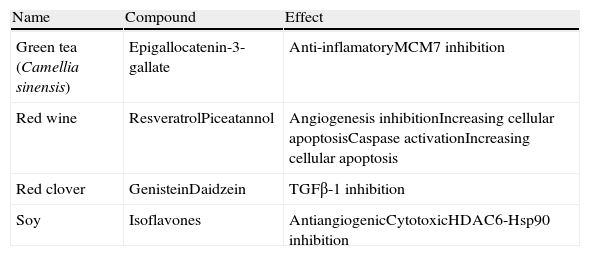To evaluate the usefulness of phytotherapy in the treatment of the benign prostatic hyperplasia (BPH) and prostatic adenocarcinoma (ADCP).
Acquisition of evidenceSystematic review of the evidence published until January 2011 using the following scientific terms: phytotherapy, benign prostate hyperplasia, prostatic adenocarcinoma, prostate cancer and the scientific names of compounds following the rules of the International Code of Botanical Nomenclature. The databases used were Medline and The Cochrane Library. We included articles published until January 2011 written in English and Spanish. We included studies in vitro/in vivo on animal models or human beings. Exclusion criteria were literature not in English and Spanish or articles with serious methodological flaws.
Synthesis of the evidenceWe included 65 articles of which 40 met the inclusion criteria. BPH: the most studied products are serenoa repens and pygeum africanum. There are many studies in favor of the use of phytotherapy but its conclusions are inconsistent due to the small number of patients, the lack of control with placebo or short follow-up. However, the use of these products is common in our environment. ADCP: there is no evidence to recommend phytotherapy in the treatment of the ADCP. There are works on prevention but only at experimental level so there is no evidence for its recommendation.
ConclusionsThe scientific evidence on the use of phytotherapy in prostatic pathology is conclusive not recommending the use of it for BPH or the ADCP.
Evaluar la utilidad de la fitoterapia en el tratamiento de la hiperplasia benigna de próstata (HBP) y el adenocarcinoma prostático (ADCP).
Adquisición de la evidenciaSe realizó una revisión sistemática de la evidencia publicada hasta enero del 2011, empleando los términos científicos fitoterapia, hiperplasia benigna de próstata, adenocarcinoma prostático, cáncer de próstata, y los nombres científicos de los compuestos siguiendo las normas del Código Internacional de Nomenclatura Botánica. Las bases de datos utilizadas fueron Medline y The Cochrane Library. Se incluyeron artículos publicados hasta enero del 2011, escritos en español e inglés. Se incluyeron estudios in vitro/in vivo sobre modelos animales o seres humanos. Los criterios de exclusión fueron literatura no española/inglesa o artículos con graves defectos metodológicos.
Síntesis de la evidenciaSe incluyeron 65 artículos, de los cuales se seleccionaron 40 que cumplieron los criterios de inclusión. HBP: los productos más estudiados son la Serenoa repens y Pygeum africanum. Existen muchos estudios a favor del empleo de la fitoterapia; no obstante, sus conclusiones son poco consistentes debido al escaso número de pacientes, la falta de control con placebo o el escaso seguimiento. A pesar de ello el empleo de estos productos es habitual en nuestro medio. ADCP: no existe evidencia para recomendar la fitoterapia en el tratamiento del ADCP. Existen trabajos respecto de la prevención, aunque únicamente a nivel experimental, por lo que tampoco existe evidencia para su recomendación.
ConclusionesLa evidencia científica acerca del empleo de la fitoterapia en la afección prostática es concluyente a la hora de no recomendarla en el empleo de la HBP o el ADCP.












